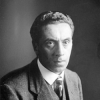Ernst Toller

Ernst Toller
Ernst Tollerwas a German left-wing playwright, best known for his Expressionist plays. He served in 1919 for six days as President of the short-lived Bavarian Soviet Republic, and was imprisoned for five years for his actions. He wrote several plays and poetry during that period, which gained him international renown. They were performed in London and New York as well as Berlin. In 2000, several of his plays were published in an English translation...
NationalityGerman
ProfessionPlaywright
Date of Birth1 December 1893
CountryGermany
The revolution is like a vessel filled with the pulsating heartbeat of millions of working people.
We revolutionaries acknowledge the right to revolution when we see that the situation is no longer tolerable, that it has become a frozen. Then we have the right to overthrow it.
As a rule, people are afraid of truth. Each truth we discover in nature or social life, destroys the crutches on which we need to lean.
The working class will not halt until socialism has been realized.
Soldiers and peasants lived together on friendly terms; they knew each other and their everyday routines, and trusted each other; they shook their heads together over the war.
Most people have no imagination. If they could imagine the sufferings of others, they would not make them suffer so. What separated a German mother from a French mother?
Slogans which deafened us so that we could not hear the truth.
And suddenly, like light in darkness, the real truth broke in upon me; the simple fact of Man, which I had forgotten, which had lain deep buried and out of sight; the idea of community, of unity.
As a boy I used to go to the Chamber of Horrors at the annual fair, to look at the wax figures of Emperors and Kings, of heroes and murderers of the day. The dead now had that same unreality, which shocks without arousing pity.
I saw the dead without really seeing them.
I was at the front for thirteen months, and by the end of that time the sharpest perceptions had become dulled, the greatest words mean.
In a quiet Franciscan monastery kind and silent monks looked after me. After many weeks I was discharged. Unfit for further service.
At that moment of realization I knew that I had been blind because I had wished not to see; it was only then that I realised, at last, that all these dead men, French and Germans, were brothers, and I was the brother of them all.